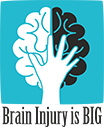empowering the severely brain injured and their families via support, understanding and a network of care
Traumatic Brain Injury
Traumatic Brain Injury (TBI)
Around one million people visit A&E each year following a head injury. While the majority of these people will experience no lasting effects, many others will be left with a traumatic brain injury (TBI) that can have devastating and lifelong effects.
A Traumatic Brain Injury is an injury to the brain caused by a trauma to the head. There are many possible causes, including road traffic accidents, assaults, falls and accidents at home or at work.
A Mild Head Injury is defined as a brief period of unconsciousness, or just feeling sick and dizzy, this may result from a person banging their head, walking into a low door way, or tripping over. It is estimated that 75-80% of all head injuries fall into this category.
A Moderate Head Injury is defined as loss of consciousness for between 15 minutes and six hours, or a period of post-traumatic amnesia of up to 24 hours. The patient can be kept in hospital overnight for observation, and then discharged if there are no further obvious medical injuries. Patients with moderate head injury are likely to suffer from a number of residual symptoms.
A Severe Head Injury is usually defined as being a condition where the patient has been in an unconscious state for six hours or more, or a post-traumatic amnesia of 24 hours or more. These patients are likely to be hospitalised and receive rehabilitation once the acute phase has passed. Depending on the length of time in coma, these patients tend to have more serious physical deficits.



